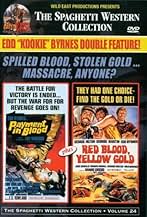Despite the title, this is an easy-going Spaghetti Western with tongue firmly in cheek; plot-wise, it’s basically THE DIRTY DOZEN (1967) out West and with the Civil War for backdrop – as a trio of adventurers (George Hilton, George Martin and Edd Byrnes) are saved from the gallows, so that they can retrieve gold stolen from the Confederates by a renegade band of soldiers led by Gerard Herter (from Sergio Sollima’s marvelous THE BIG GUNDOWN [1966]). Along the way, they also have to deal with a band of Mexican outlaws (who, naturally, covet the gold): interestingly, this is presented as a family unit (albeit a loutish and ugly-looking bunch) controlled by an old woman who all she seems to do is stuff herself with food!
The heroes, then, all have their characteristics: Martin is himself a Mexican horse-thief, Hilton a defrocked priest with a penchant for explosives(!) – this combination of sardonic piety and ecstatic outbursts results in an occasionally hammy performance, while Byrnes is the requisite renegade American (amusingly called “Chattanooga Jim”); for the record, Hilton and Byrnes would re-unite soon after for the similarly lightweight ANY GUN CAN PLAY (1967). Given that they’re technically prisoners till the accomplishment of the mission, their movements are overseen by an officer; however, half-way through, the latter leaves with a girl they come across at an isolated house (whose other inhabitants had all been murdered by Herter & Co.) in order to drum up support for the inevitable confrontation between prisoners, soldiers and outlaws…except that the Cavalry that charges to the ‘rescue’ is from the opposite side, the Unionists, since the officer turns out to have been a spy all along!
Anyway, being a generally light-hearted entertainment, the heroes still end up in possession of the gold – amid brawling, double-crosses and shoot-outs galore! Incidentally, director Cicero would spend most of his later career helming low-brow sex comedies featuring Edwige Fenech and the like. The film under review does provide a typically pleasant score courtesy of one Carlo Pes.




























